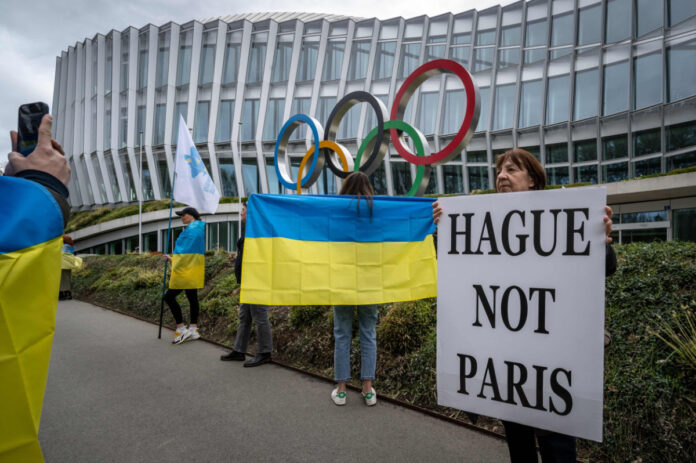PARIS: International sports bodies are taking wildly varying stances on allowing Russian and Belarusian athletes and teams to compete while the war in Ukraine continues.
With the Paris Olympics fewer than 500 days away, the International Olympic Committee (IOC) says it wants to continue its ban “on flag, anthem, colors or any other identifications” from the two countries but is seeking a pathway to let their athletes compete.
That strategy will be discussed again this coming week when the IOC executive board meets.
Here, AFP Sport looks at how sports are handling the dilemma.
While World Athletics on Thursday lifted the ban on the Russian track and field federation for state-sponsored doping, its athletes remain barred from competition while Moscow’s invasion of Ukraine continues. The body’s president Sebastian Coe said “the unprecedented sanctions” imposed on Russia and Belarus by countries around the world “appear to be the only peaceful way to disrupt and disable Russia’s current intentions and restore peace.”
Russian and Belarusian players are allowed to compete on the main ATP and WTA tours but not under their flags or country names. They are banned from the Davis Cup and BJK Cup tournaments. Players from Russia and Belarus were also banned from Wimbledon last year although Moscow-born Elena Rybakina, competing for Kazakhstan, won the women’s singles title.
Russia was thrown out of 2022 World Cup qualifying and are banned from Euro 2024 qualifying which started this week. Instead Russia played a friendly in Iran.Belarus are not banned from Euro qualifying but they must play home games at neutral venues while their clubs are still allowed to enter European tournaments.Denis Rogachev, the head of the Russian Football Union, said “negotiations are underway” to play in the Central Asian championship in June and that “a negotiation process is underway with UEFA and FIFA on a phased return.”
The sport has not yet lifted the ban on Russians and Belarusians, which means none have so far qualified for Paris or this year’s World Championships in October. The next opportunity for teams and individuals to book a place for the worlds, where Olympic places will be up for grabs, are the European Championships in Turkiye in April. Russians and Belarusians were not included in the European draw on Tuesday, the cutoff point for competing. Switching to Asia could offer an Olympic pathway to Russians.
Russian fighters were allowed to compete at the recent women’s world boxing championships in India, a move which prompted a boycott by countries including United States, Ukraine, Canada, Sweden and Britain.
Theoretically, drivers from Russia and Belarus can compete as “neutral” drivers in Formula One. But the only Russian driver, Nikita Mazepin, was dropped shortly before the start of the 2022 season by the Haas team. F1 also dropped the Sochi Grand Prix from its 2022 schedule, and canceled plans for annual races to be held in St. Petersburg starting this season.
Russia and the Soviet Union have won the annual ice hockey world championship seven times but on Thursday the International Ice Hockey Federation banned them for a second straight year saying that “it is not yet safe to reincorporate the Russian and Belarusian teams.”
With its Olympic qualifying process about to start, the International Fencing Federation decided on March 10 to allow Russian and Belarusian athletes to take part, although it said it was up to the IOC whether they could compete in Paris. The German, Finnish and Swedish fencing bodies responded by canceling events they were due to host.
Russians and Belarusians were banned from the world championships in Budapest last June and July. For now, aquatic sports are among those playing a waiting game. Governing body FINA told AFP in February: “At this time, there are no further updates regarding the participation of Russian and Belarusian athletes in World Aquatics competitions.” That means they are still banned from the world championships in Fukuoka in July, but the sport’s Olympic rules means swimmers have until late next June to match the qualifying times.

